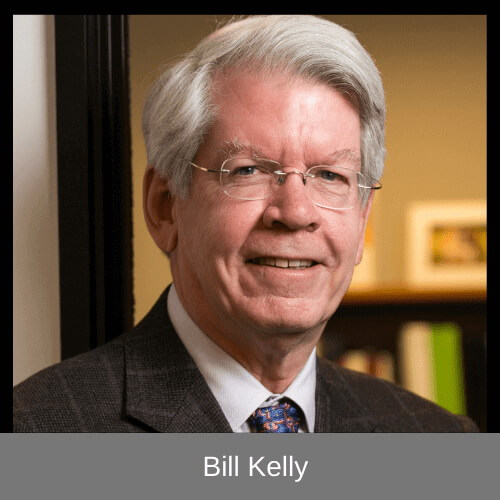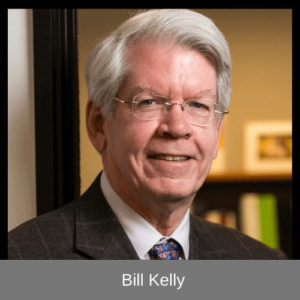
William C. Kelly Podcast Ep. 61 - Referred to as Bill Kelly, the developer of a co-creation model to bring social change to affordable housing. He was a special assistant and executive assistant to the secretary of HUD Carla Hills from 1975 to 1977. He was only 30 years old at the time but he and Carla clicked in style and substance. When he left HUD, he joined the law firm of Latham and Watkins where he worked for 25 years as a partner. He had experience with the United States supreme court as a law clerk in his early days. He co-created the National Affordable Housing Trust in 1996, and in 2003 he was a co-founder and president of the Stewards of Affordable Housing for the Future (SAFE) which now has 13 nonprofit members who own 150,000 affordable housing. He now serves on the low-income investments fund board.
Top Takeaway:
-
- The capacity and ability of affordable housing nonprofits to take more than they would do
- The success and effectiveness of the Stewards of Affordable Housing for the Future (SAFE) in the low-income population
- The importance of improving health and wellness through affordable and decent living situations
- How to support the wellbeing of leaders and staff to change the idea of social change organizations
Listen in to learn the importance of advocating for affordable housing to give access to rental access to everyone that needs it.
"I think that people who are interested in the housing industry should develop a strong skillset, so they have a place at the table early on in their career. " -Bill Kelly
CAREER
William Kelly stayed away from HUD-related work at his law firm for seven years because he felt uncomfortable being an advocate to the same people to whom he had given direction on behalf of the Secretary. He stayed involved in affordable housing through his relationship with Cushing Dolbeare and the National Low-Income Housing Coalition.
In 1986, he was very active on the Hill supporting the Low-Income Housing Tax Credit, but particularly working to make sure that it could be used by nonprofit developers.
With Retirement Housing Foundation and National Church Residences, both nonprofits, he co-created the National Affordable Housing Trust in 1986. With a $1 million program related investment from the Ford Foundation and the tolerance of his law firm as bills remained unpaid for months, they were able to launch an early tax credit fund that may have been the first public securities offering by a nonprofit. NAHT has gone on to raise $ 1 billion+ of tax credit equity. A few years ago, he led a successful effort to make NAHT effectively a subsidiary of Stewards of Affordable Housing for the Future. He is a great believer in co-creation for social change.
He created Stewards of Affordable Housing for the Future, an industry group that could seek broadly applicable policy solutions. SAHF's 13 members now control about 150,000 apartments in 49 states affordable to low-income families, typically with project-based assistance and often capitalized with tax credits.
BOARDS
Bill served on the Boards of Directors of Ashoka, which spearheaded the idea of social entrepreneurship globally, and the International Senior Lawyers Project, and now serves on the Low Income Investment Fund Board.
EDUCATION
J.D., Yale Law School, 1971 Note and Comment Editor, Yale Law Journal A.B. Harvard College, magna cum laude, 1968
HONORS
He was awarded a Purpose Prize Fellowship, which recognizes leaders over 60 who have launched second careers innovating in the social sector and multiple awards for his pro bono leadership from the DC Bar, the American Bar Association, and and the ABA's Forum on Housing and Community Development Law.
-Affordable Housing Visionary, Preservation of Affordable Housing (POAH), 2011
-Purpose Prize Fellow, 2007
-Peter Mullen Visiting Professor, Georgetown University, 2006-2007
-Michael S. Sher Award, Forum on Housing & Community Development Law, American Bar Association, 2006
-Friend of the Elderly, 2004, Retirement Housing Foundation
-National Public Service Award, Section of Business Law, American Bar Association, 2003
-D.C. Bar Pro Bono Lawyer of the Year, 1999
Learn how affordable housing can serve as a platform for residents to achieve their goals.
Key Moments:
William C. Kelly discusses the importance of the American Academy of Housing in filling the historical gap of housing and community development [3:21]
He describes his role at HUD working with Carla Hills- the accomplishments and challenges he and his team faced [4:49]
Bill explains how he ended up as the assistant to the secretary of HUD working with Carla [14:24]
He talks about how his career panned out after leaving HUD, including working with affordable housing nonprofits [16:50]
He explains how he pushed for nonprofits to be functioning at scale [18:53]
The creation of the National Affordable Housing Trust and how it had been recreated over the years [20:58]
The Stewards of Affordable Housing for the Future (SAFE) in facilitating the creation and preservation of affordable housing for people of limited economic means [23:08]
How SAFE shifted from preservation issues to other programs like energy efficiency and improving the lives of residents [26:21]
Finding a flexible and effective way of working together to get to the core of the matter [31:39]
Bill explains the lack of enough resources plus systemic racism as the main challenges in affordable housing [34:57]
The dream of vibrant communities and all people having access to rental assistance that Bill has [37:57]
Bill advises young people interested in the affordable housing industry to develop a skill and have diversified experiences [38:27]
Resources:
Podcasts Like This:

